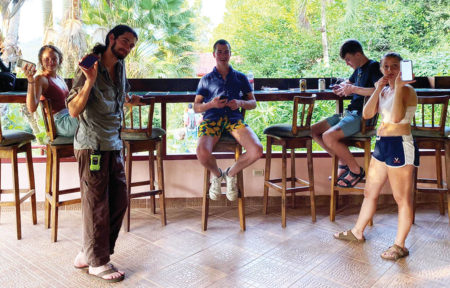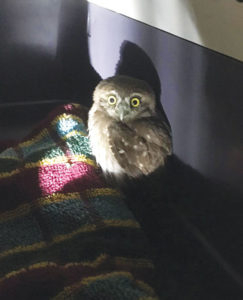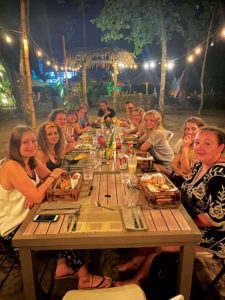The Untold Challenges of Wildlife Rescue
 By Mckenzie Wing
By Mckenzie Wing
Volunteer Coordinator & Biologist
 How do you receive animal calls with no internet or cell service? How do you drive an animal ambulance down a road washed out by floods? How do you perform complicated surgery on a monkey during a power outage, when the clinic equipment and AC don’t work?
How do you receive animal calls with no internet or cell service? How do you drive an animal ambulance down a road washed out by floods? How do you perform complicated surgery on a monkey during a power outage, when the clinic equipment and AC don’t work?
These are the kinds of challenges that have been faced by KSTR staff and volunteers over the years. Technical, environmental, animal—we’ve seen it all. Our remote location puts us at a good distance from human activity for animal rehabilitation, but creates myriad difficulties for running a working rescue center, public sanctuary, and staff/volunteer residence with many, many moving parts.
 Yet somehow we make it work. This last month has been especially difficult, first with a severe local drought that put pressure on our ability to collect enough fresh wild leaves for our sloths. But we organized a rotation of people to drive to the coast for beach almond and scour the nearby forest for sota caballo. More recently, a loss of internet provider and utter lack of outside communication has made the process of receiving animal calls nearly impossible, but a stop-loss system of local volunteers and relayed phone calls means that we’ve been able to respond to injured wildlife.
Yet somehow we make it work. This last month has been especially difficult, first with a severe local drought that put pressure on our ability to collect enough fresh wild leaves for our sloths. But we organized a rotation of people to drive to the coast for beach almond and scour the nearby forest for sota caballo. More recently, a loss of internet provider and utter lack of outside communication has made the process of receiving animal calls nearly impossible, but a stop-loss system of local volunteers and relayed phone calls means that we’ve been able to respond to injured wildlife.
 We’ve rescued and already released several birds, including an aracari with a broken beak and a tiny pygmy owl found wandering Quepos in a daze like a lost tourist. We’ve just had two young sloths graduate from our Nursery and move to “Boot Camp,” a pre-release area where they’re get to practice the skills they’ll need to survive on their own. We’ve had several squirrel monkeys reunited into a group in the Sanctuary after recovering from surgery. And it’s all due to a dedicated group who work all day in the hottest time of the year, then go back to a home without any Netflix. It’s truly impressive.
We’ve rescued and already released several birds, including an aracari with a broken beak and a tiny pygmy owl found wandering Quepos in a daze like a lost tourist. We’ve just had two young sloths graduate from our Nursery and move to “Boot Camp,” a pre-release area where they’re get to practice the skills they’ll need to survive on their own. We’ve had several squirrel monkeys reunited into a group in the Sanctuary after recovering from surgery. And it’s all due to a dedicated group who work all day in the hottest time of the year, then go back to a home without any Netflix. It’s truly impressive.
Part of it is their passion for the animals. Part of is their adaptability. Part of it is their ability to make the most of difficult situations. Weather too hot? Take a break in the shade and work on research projects for a while. Need to go to Quepos to monitor the phone? Use the opportunity to grab some sloth leaves. No Wi-Fi in the evenings? Fall asleep to the sound of the cicadas. That last one works for me, anyway.
 The point is, KSTR is more than just a rescue center. We are a home for people and animals who come in for different reasons and for varying lengths of time. We are a complex, multifaceted organization. And as I said before, we are many, many, moving parts. And challenge or issue is compounded a hundredfold.
The point is, KSTR is more than just a rescue center. We are a home for people and animals who come in for different reasons and for varying lengths of time. We are a complex, multifaceted organization. And as I said before, we are many, many, moving parts. And challenge or issue is compounded a hundredfold.
But somehow we make it work. I couldn’t be prouder of my team. And if anyone is interested in being a part of this team, look us up. Contact me, the Volunteer Coordinator. I’ll get right back to you. At least if our internet stays back on.

